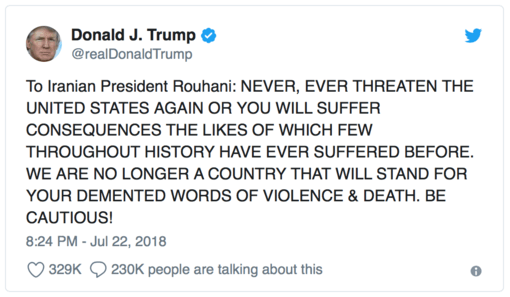We must not be side-tracked by the clownish behaviour and personality quirks of Donald Trump. Whilst he is having a major effect on current US strategic directions we must nevertheless concentrate on the system of US imperialism and the steps it is taking to maintain its domination of the world by military means. Conflicts within US ruling circles may reflect a difference of opinion on whom to take on first: Russia or China. It was revealed last week that the old war-horse Kissinger supports closer relations between Us imperialism and Russia in an attempt to isolate and counter China.
In any case, US imperialist forces represented by Trump are leaning towards instigating war with China, first. Hence Trump berating EU/NATO, historically a very loyal and subservient ally of US imperialism in Europe against Russia and formerly the Soviet Union. Another section of the imperialist ruling class (represented by the Democrats) prefers war with Russia and is dependent on NATO/EU. There are big divisions within US imperialism on strategies in dealing with China and Russia, driven by the severe economic crisis domestically. The situation is very complex and fast moving. All developments need to be viewed as multifarious and interdependent, not in isolation and disconnected. Appearances are deceptive.
War is necessary for imperialism to resist the inevitability of changes that threaten its dominance. Imperialist politics is war without the use of weapons. Trade war is imperialist politics lifted to a level at which real war is a potential next step. It is like a card game in which the gamblers have raised the stakes so high that a desperate recourse to the gun under the table becomes the only answer to an “all or nothing” outcome.
It may well suit Trump to have the world focus on his relationship with Putin. It diverts attention from US imperialism’s arrangement of those of its proxies closest to China in the event of war in our region. Speaking at the United States Studies Centre at the University of Sydney on July 19, Penny Wong quoted a 2017 PWC report The World in 2050 which projects the four largest economies at 2050 to be China, India, US and Indonesia in that order. That is, we are moving from a Euro-centric view of world power to one in which the four largest economies will be those of Indo-Pacific nations, with two of those predicted to be greater than the US is now. She said that within a decade, the Chinese economy is set to become nearly twice as large as the economies of the US, India ($20.9 trillion) and the EU ($23.3 trillion) and seven times larger than the economy of Japan. These predictions indicate that current tensions (subject to the law of uneven development) are unlikely to subside, but will rather increase and that therefore, so will the danger of war.
The increasing instability and transition in international conditions (the power and strength of international capital moving towards China as a base) impacts on local Australian conditions – economically, politically and militarily. Tony Abbott has called for a doubling of our “defence” expenditure, in line with Trump’s demands on NATO members. Penny Wong addressed in part the “re-configured way the US is setting about conducting itself in the management of global affairs”. She nailed the Labor Party firmly to the mast of “US values” but refrained from detailing the elements of Trump’s “reconfigurations”. We recently published the article “US imperialism gathers its proxies and prepares for war” which analyses how US imperialism is lining India up alongside Japan and Australia as part of its encirclement of China. We need to keep in mind the impact of US-China rivalry on the various parts of the Australian ruling class, monitor the emerging pro-China comprador elements and listen closely to how the Australian people are expressing their discontent with “selling off Australia”, especially resources and public utilities and infrastructure.
US imperialism’s grand designs in relation to China are the biggest threats to world peace, but hot spots exist in many local conflicts whether of a secessionist nature, or arising from the aggressions of an imperialist-backed regional power such as the Zionist regime in Occupied Palestine, or from tensions between near neighbours (Turkey and Greece), or from social contradictions arising from the revival of actual fascism in countries like Poland and Hungary.
The theoretical basis of our analysis has to be grounded in materialist dialectics, and Mao Zedong’s “On Contradiction” in particular.

